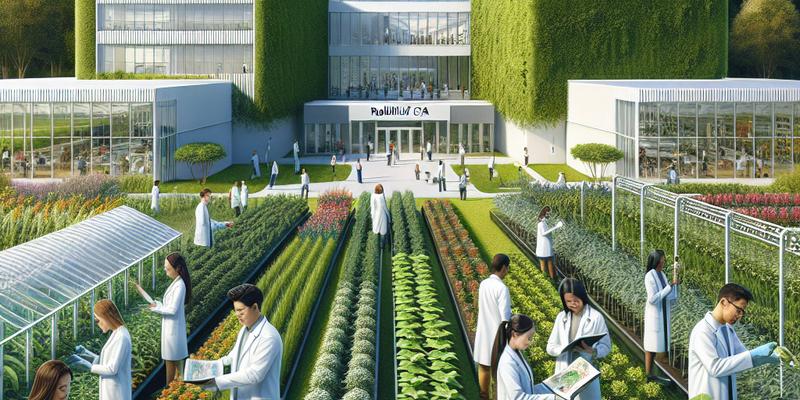As the world grapples with climate change and dwindling resources, sustainable farming is rising to the forefront of agricultural practices. This shift isn’t just a trend; it’s an urgent necessity for our planet’s future. Enter BTS Agricole education—a transformative program that equips aspiring farmers with the knowledge and skills they need to embrace sustainability in their practices.
With innovative strategies and a focus on eco-friendly techniques, BTS Agricole is shaping the next generation of agriculture leaders ready to tackle pressing environmental challenges head-on. The journey towards sustainable farming starts here, where education meets action, creating a ripple effect that extends far beyond the classroom.
The Importance of Sustainable Farming
Sustainable farming is vital for preserving our planet’s resources. It promotes practices that protect the environment while ensuring food security for future generations.
Farmers can enhance soil health by using techniques like crop rotation, organic fertilizers, and reduced pesticide use. Healthy soil leads to better yields and resilient crops. sustainable methods lower carbon footprints. They focus on reducing greenhouse gas emissions and conserving water—two pressing concerns in today’s climate crisis.
Biodiversity thrives under sustainable farming systems. These practices encourage a variety of plants and animals, creating balanced ecosystems that naturally control pests and diseases.
Community involvement plays a crucial role. Sustainable farming encourages local economies by supporting small-scale farmers prioritizing environmental stewardship over profit margins. This approach fosters stronger connections between consumers and producers while promoting healthier diets.
The Impact of BTS Agricole Education on Sustainable Farming
BTS Agricole education is transforming the landscape of sustainable farming. Equipping students with practical skills and theoretical knowledge fosters a new generation of environmentally-conscious farmers.
Graduates emerge with a deep understanding of ecological practices. They learn how to manage resources efficiently while minimizing environmental impact, which benefits their farms and strengthens local ecosystems.
The emphasis on innovation within BTS Agricole programs encourages creative solutions to age-old agricultural challenges. Students are trained to embrace modern techniques that promote sustainability, such as permaculture and organic farming. the collaborative environment nurtures partnerships among future farmers. These connections pave the way for shared learning experiences focused on sustainability and resilience in agriculture.
As these graduates enter the field, they commit to sustainable practices, influencing peers and communities. The profound ripple effect lays the foundations for responsible food production systems.
Success Stories from BTS Agricole Graduates
BTS Agricole graduates are making waves in the agricultural sector. Their innovative approaches to sustainable practices showcase the power of education in transforming traditional farming.
Take Sophie, for example. After completing her studies, she implemented organic farming methods that boosted crop yields while reducing chemical usage. Her farm flourished and became a model for local farmers seeking eco-friendly solutions.
Then there’s Marco, who founded a cooperative focused on permaculture techniques. His initiative has empowered small-scale farmers by providing them with the resources and training necessary for success in today’s market.
These inspiring stories reflect how BTS Agricole equips students with essential skills to drive change within their communities. The graduates don’t just enter the workforce; they become leaders advocating sustainability and innovation in agriculture. Their journeys illustrate that education is key to cultivating a greener future for all.
The Role of Technology in Sustainable Farming and BTS Agricole Education
Technology plays a crucial role in transforming sustainable farming practices. Through advanced tools and innovative solutions, farmers can maximize productivity while minimizing environmental impact.
BTS Agricole education integrates modern technology into its curriculum. Students learn about precision agriculture, which uses data analytics to optimize resource use. This method reduces waste and boosts crop yields.
Additionally, the program introduces smart irrigation systems. These systems help conserve water by ensuring crops receive only what they need. This is a game changer for regions facing water scarcity.
Moreover, drones and satellite imagery provide real-time insights into soil health and crop conditions. By harnessing these technologies, BTS Agricole graduates are well-equipped to implement eco-friendly practices on their farms.
The synergy between technology and sustainable farming is vital for future generations of farmers aiming to create resilient agricultural systems prioritizing productivity and sustainability.
Challenges Faced by the Agriculture Industry and How BTS Agricole is Addressing Them
The agriculture industry faces numerous challenges today. Climate change, soil degradation, and water scarcity are pressing issues threatening food security. Farmers often struggle with outdated techniques and limited access to modern resources.
BTS Agricole steps in here as a beacon of hope. This educational program equips students with the latest knowledge of sustainable practices. Graduates learn how to combat environmental challenges using innovative methods.
BTS Agricole emphasizes collaboration among farmers. Fostering community ties encourages sharing best practices and solutions tailored to local conditions.
Through hands-on training, students gain real-world experience that prepares them for the complexities of modern agriculture. They emerge not only as skilled practitioners but also as informed advocates for sustainable farming within their communities.
Conclusion:
The future of sustainable farming is promising, especially with initiatives like BTS Agricole education paving the way. Focusing on sustainability benefits the environment and creates a resilient agricultural sector that can withstand challenges.
BTS Agricole graduates are equipped with valuable knowledge and skills to implement eco-friendly practices. Their success stories inspire others in the industry to adopt innovative solutions prioritizing sustainability.
As technology continues to evolve, its integration into agriculture becomes increasingly vital. BTS Agricole embraces this change by incorporating modern tools and techniques into its curriculum. This approach ensures students are prepared for the realities of contemporary farming while advocating for environmentally friendly practices.
Challenges in agriculture remain significant, from climate change to resource depletion. However, programs like BTS Agricole address these issues head-on by educating future innovative and adaptable leaders.
Sustainable farming represents more than a trend; it’s a critical path forward for our planet’s health and food security. With institutions like BTS Agricole leading the charge, there’s hope for a greener tomorrow in agriculture.


